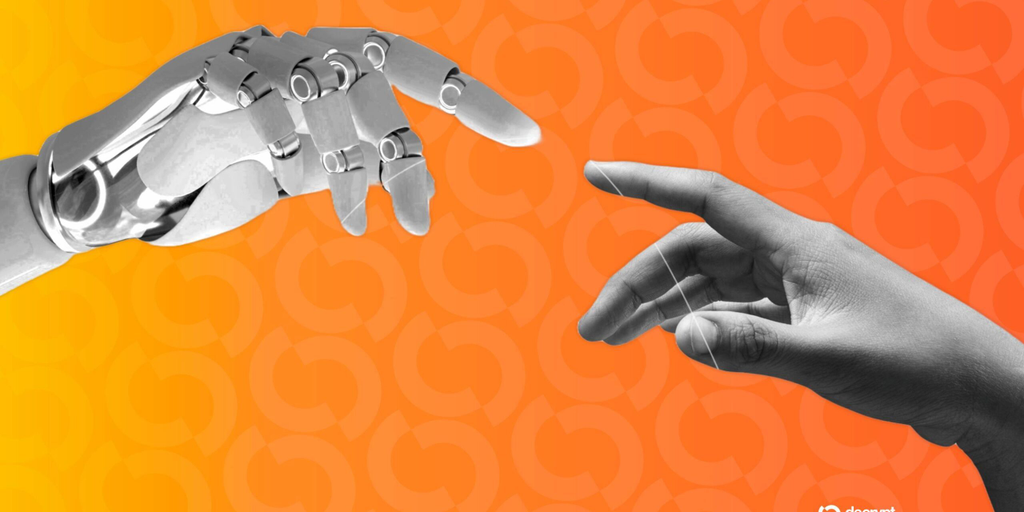In short
- Author Billy Hallowell has warned that AI chatbots could become tools of the “demonic kingdom”.
- Many churches are instead embracing AI for sermons, services and outreach.
- Scholars argue that technology has always inspired faith and fear, and AI is no different.
As artificial intelligence becomes more sophisticated, could your favorite chatbot really be a portal to hell? That’s the premise laid out by journalist and Christian influencer Billy Hallowell, who says AI can lead to demonic influence.
In a recent episode of After party with reporter Emily Jashinsky, Hallowell – an author and religious commentator with 300,000 followers on Facebook and X – warned that the big language models could become tools of the devil.
“The demonic realm actually uses technology very often. This is something that comes up in a lot of stories,” Hallowell said. “I’ve actually had personal experience with this in my life where I see technology being manipulated or used.”
While Hallowell acknowledged the absurdity of his claim, he went on to say that he had come across stories from police officers and others who believed the technology had been “bypassed” during supernatural encounters.
Hallowell, whose 2020 book Playing With Fire explored modern cases of possession and exorcism, said he is very cautious about how quickly people have latched onto the technology.
“People are becoming dependent on AI,” he said. “They’re coming in relationships with AI, they’re looking to AI for all the answers.”
Hallowell likened that dependence to the spiritual and intellectual decline of a culture that is “stupid, confused and lost,” and now giving up the last act of thinking for itself.
“You know, if you are Satan, and you are the devil, the enemy, the purpose of Satan is to kill, steal, destroy, and confuse,” he said. “So why don’t you use a tool that can actually communicate and speak for more of these actions on the human population?”
That anxiety and moral panic are not new. Long before the last AI boom with the public launch of ChatGPT in November 2022, Elon Musk warned that humanity could be “summoning the devil”. Speaking at MIT in 2014, the head of Tesla and SpaceX compared AI researchers to a magician trying to summon a spirit.
“You know all those stories where there’s the guy with the pentagram and the holy water and he’s sure he can control the demon,” he said. “It doesn’t work.”
A modern moral panic
Over the centuries, new processing technology has often brought its own moral contest.
When the printing press appeared in 15th century Europe, church leaders called it an instrument of heresy. Centuries later, the critics claimed telecommunication devices, including the telegraph, radio and television, were channels for evil.
More recently, in the 1980s, a “Satanic Panic” caused parents and pastors to accuse. Dungeons & Dragons and heavy metal music recruiting children to Satan’s cause. The same script is being played again with violent video games and movies, blamed for the corruption of an entire generation.
Religious commentators and theologians have increasingly linked the rise of artificial intelligence with ancient fears of spiritual corruption. In 2024 essay titled “Can AI Be Demon Possessed?” Lutheran theologian Ted Peters examined whether machines could be vessels for evil, citing Musk’s long-standing commitment to “summoning the devil.” Peters concluded that while literal possession is unlikely, AI can still act “demonic” if it manipulates or harms human beings.
Faith and the feedback loop
According to Joseph Laycock, an associate professor of religious studies at Texas State University, this fascination with divine or infernal machines fits a familiar historical pattern.
“We’ve always had a tendency when new technology comes out, especially new communication technology, to ascribe some sort of supernatural or divine meaning,” Laycock said. Decrypt.
He traced the lineage from the Greek theater deus ex machina – “god from the machine” – to 19th-century spiritualists who believed the telegraph could reach the dead. The first photographers claimed to capture ghosts on film; Now, the internet and AI are amplifying the same impulses at scale.
Laycock also noted how loneliness and emotional vulnerability often drive people toward technologies that promise comfort or connection.
“I’m afraid of a scenario where nobody thinks for themselves – they just defer to AI for everything – and Elon Musk has to say what he says,” added Laycock. “That would make Elon Musk a god if he controls the program that everyone relies on to define reality.”
Laycock’s fears could be the ultimate irony, with Musk moving from warning about AI demons to building the altar that summons them.
Generally intelligent Newsletter
A weekly AI journey narrated by Gen, a generative AI model.

